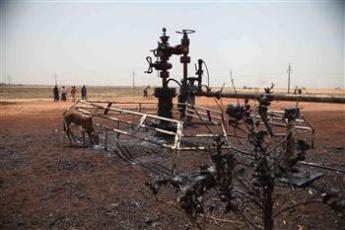Oil causes first crack in Sudan peace deal but stability not endangered
CAIRO, March 9 (AFP) — An oil dispute between Khartoum and former southern rebels is proving to be the first challenge to the peace deal they reached in January, but analysts and officials say there is no risk to stability.
 The rhetoric has escalated between the southern Sudanese authority and Khartoum over conflicting deals signed respectively with British oil start-up White Nile and French giant Total.
The rhetoric has escalated between the southern Sudanese authority and Khartoum over conflicting deals signed respectively with British oil start-up White Nile and French giant Total.
The British firm signed a contract last July with the Nile Petroleum Corp., which is the body set up by the former rebel movement of Sudanese People’s Liberation Movement (SPLM) to manage oil concessions.
White Nile, a company co-founded by former England cricketer Phil Edmonds, grabbed the headlines last month when its share value multiplied 13-fold on the London stock exchange after announcement of the deal.
But in December, before the peace deal was signed, Total renewed with Khartoum a contract for the same oil fields it had signed more than 20 years ago.
“There are conflicting deals but the fields are out of the sphere of influence of the government and White Nile signed its deal before Total,” White Nile spokesman Hugo de Salis told AFP.
“Total had an agreement in the early eighties, but when President Omar al-Beshir made his coup in 1989, he cancelled all existing deals,” he explained.
Sudanese government officials have vehemently denied the south’s right to grant licenses and warned against any attempt to undermine its authority until an interim government is set up later this year.
The central government backs Total, which itself insists its agreement is still valid.
“Our position is very simple: we signed a contract in December and we have not been informed of any changes to our rights,” Total’s representative in Sudan, Bernard Cullet, told AFP.
Costello Garang Ring, the government of southern Sudan’s commissioner for international development, supports White Nile’s claim and stresses the SPLM is the legitimate authority as it controls the disputed oil fields.
“The peace agreement says that oil revenue from the south in the future will be divided 50-50, but we get nothing from activites in the north. So if the government controls all oil fiels, there is a chance we will not be able to develop our own petrochemical industry,” he explained.
“Total signed an agreement for Block B under the dictatorship of Jaafar Nimeiri. Total could have informed us of the deal since we have controlled the area all this time but we have seen nothing,” he told AFP.
“They could have chosen to see both sides and we would have discussed the issue, but they went to Khartoum. So we set up a joint venture with White Nile,” he added.
The peace agreement provides for the establishment of a joint oil commission with a rotating presidency to decide on concessions, but it stipulates that deals reached before the signing should be fulfilled.
“The document doesn’t specify agreements signed by who,” Garang argued.
The dispute comes after 22 years of conflict between the two sides and amid simmering acrimony despite the signing of the landmark deal, reviving fears that oil wealth could once again generate strife.
“It has been a factor of conflict all these years,” said David Mozersky, an analyst with the International Crisis Group think-tank.
“The oil regions were on the front line during the war and, in the longer term, oil revenue gave the government a serious boost in terms of the financial assets it had to play with in conducting the war,” he said.
But Mozersky stressed that the only pipeline running through the south leads to the northern government-controlled Red Sea harbour of Port Sudan and predicted that both sides would settle the issue through a legal body.
“In the short term, the south can’t do anything with the oil. I don’t see this dispute as deal-breaker; it can probably be resolved legally,” he said.
Khartoum-based expert Omer Sidahmed also took the view that neither side would take steps that would threaten the peace agreement.
“Sudan is heavily reliant on oil and it will continue to be a contentious issue, but nobody wants to return to war,” he said.
“Although this acreage has never produced oil yet, the reserves in Sudan are huge and competition is fierce but I think eventually the issue of oil will be a uniting factor rather than divisive one.”
